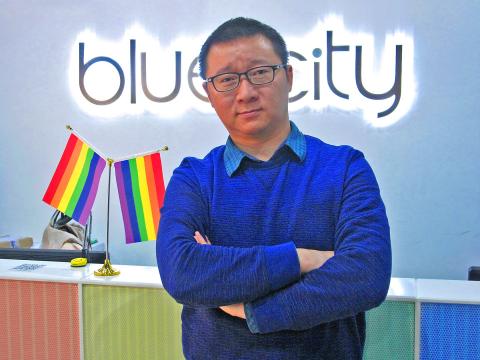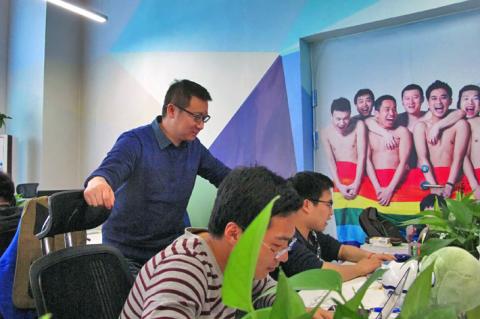An interesting news report last month from China caught my attention. According to Apple Daily, a Chinese man parked his luxury BMW, which was filled with yellow roses, in downtown Shanghai on Jan. 24. He then stepped out of his car, knelt on one knee and proposed to his boyfriend in front of a crowd. Surprised by the sudden and very public move, the boyfriend quickly said “yes.” They kissed happily.
The marriage proposal caused a sensation online after a series of photos were posted on Sina Weibo (新浪微博) pages, and most of the comments were quite positive. Some netizens joked that no wonder it is difficult for women to find good men, because many “tall, rich and handsome” (高富帥) guys are all gay, while others said that China should encourage same-sex marriage to resolve a serious gender imbalance.
Intriguingly, the marriage proposal took place in a country that is not so friendly to the lesbian, gay, bisexual and transgender (LGBT) community. Although homosexuality may have existed throughout China’s five thousand years of history, LGBTs are still often treated like second-class citizens.

Photo: Reuters
SLOW CHANGES
The marriage proposal was not the first of its kind. In October 2012, Lu Zhong (陸忠) and Liu Wanqiang (劉萬強) held a same-sex wedding in China’s Fujian Province.
In January last year, Wang Sicong (王思聰), the son of China’s richest man Wang Jianlin (王健林), surprised the public by revealing that he is bisexual on his Sina Weibo page.

Photo: Reuters
Last month in Shenzhen, a gay man nicknamed A-yi (阿易) filed the first lawsuit against workplace discrimination after his company fired him because of his sexual orientation.
China has been slow to accept homosexuality. The Chinese government did not decriminalize gay sex until 1997, and homosexuality was classified as a “psychiatric disorder” before 2001. According to a report in Deutsche Welle last year, “Today, the Chinese government no longer harasses LGBT people on one premise: they cannot show homosexual behaviors at public occasions or make related political appeals.”
This reminds me of then US president Bill Clinton’s “don’t ask, don’t tell” policy in the military in the 1990s. The problem is, as Internet and smartphone technology continues to develop rapidly, an open policy seems inevitable.
BOOMING MARKET
Take the smartphone app Blued for example. Ever since China’s Blue City (藍色城市) launched the gay dating app in 2012, it has astonishingly attracted more than 15 million members — including 3 million members from outside China.
Popular gay dating apps Grindr of the US and Jack’d of Belgium also have users in China, but they can hardly compete with Blued in the huge Chinese market. Blued is already the world’s largest gay dating app, while its biggest competitor Grindr has about 10 million users.
Even Chinese officials are working with the app to battle the spread of HIV/AIDS, as they reach out to LGBT people by providing information on condom use and AIDS, as well as free HIV tests to the users.
According to a report in Bloomberg Businessweek last year, entitled “World’s largest gay dating app, born in China, now attracts global investors,” Silicon Valley-based DCM Ventures was investing US$30 million on Blued. “We believe that the gay community in China will probably be the largest in the world in the future,” the report quoted DCM co-founder David Chao (趙克仁). Blued’s users are “a great audience for middle to upper-end products and services that are starting to take off in China,” Chao added.
And he may be right. China is the world’s most populated country, so it could be the largest country in terms of LGBT population theoretically. Most studies show that LGBT people usually account for three and a half to five percent of the total population. In other words, among the approximately 1.39 billion Chinese people, up to 69 million people are homosexuals, a figure three times higher than the total population of Taiwan.
WHAT CAN TAIWAN DO?
Are these cases showing the wind of change in China? If so, what role should Taiwan play? Since the two sides are closely linked geographically and culturally, Taiwan’s potential impacts on China’s LGBT community deserve our attention.
In the face of China’s ongoing changes, Taiwan has often played an influential role. The country is relatively friendly to LGBT people and has a positive impact on Chinese LGBTs. Through frequent cross-strait exchanges in recent years, an increasing number of LGBTs from China are visiting Taiwan to experience the friendly atmosphere.
James Yang (楊震), Beijing LGBT Center’s (北京同志中心) director of development, was overwhelmed when he flew to Taiwan to attend the Taiwan LGBT Pride Parade (台灣同志遊行) in October last year.
Carrying a handmade placard from Beijing LGBT Center above his head, Yang could barely proceed along the parade route because so many people wanted to be photographed by his side, the New York Times reported last year.
“I’ve been to gay pride marches in New York, San Diego and Los Angeles, but this is so emotional for me,” Yang told the New York Times as he proudly marched with more than 65,000 LGBT people and their supporters through downtown Taipei. “It’s really exciting, but at the same time, the outpouring of support reminds me of how far behind we are in China,” he added.
As Bloomberg Businessweek concluded, attitudes toward homosexuality are changing quickly — although unevenly — across China.
Taiwan should certainly seize the business opportunities posed by the large Chinese market. For example, people in Taiwan’s high-tech industry are particularly skilled at designing fun and creative smartphone apps, so they can actively explore this booming area.
But more importantly, since gay rights are human rights, Taiwan should offer greater protection of gay rights and set a good example for China. We could inspire the Chinese people and even their government, serving as a positive influence for Beijing. Don’t be an absentee in the transformation of the world’s largest gay country.

The primaries for this year’s nine-in-one local elections in November began early in this election cycle, starting last autumn. The local press has been full of tales of intrigue, betrayal, infighting and drama going back to the summer of 2024. This is not widely covered in the English-language press, and the nine-in-one elections are not well understood. The nine-in-one elections refer to the nine levels of local governments that go to the ballot, from the neighborhood and village borough chief level on up to the city mayor and county commissioner level. The main focus is on the 22 special municipality

The People’s Republic of China (PRC) invaded Vietnam in 1979, following a year of increasingly tense relations between the two states. Beijing viewed Vietnam’s close relations with Soviet Russia as a threat. One of the pretexts it used was the alleged mistreatment of the ethnic Chinese in Vietnam. Tension between the ethnic Chinese and governments in Vietnam had been ongoing for decades. The French used to play off the Vietnamese against the Chinese as a divide-and-rule strategy. The Saigon government in 1956 compelled all Vietnam-born Chinese to adopt Vietnamese citizenship. It also banned them from 11 trades they had previously

Hsu Pu-liao (許不了) never lived to see the premiere of his most successful film, The Clown and the Swan (小丑與天鵝, 1985). The movie, which starred Hsu, the “Taiwanese Charlie Chaplin,” outgrossed Jackie Chan’s Heart of Dragon (龍的心), earning NT$9.2 million at the local box office. Forty years after its premiere, the film has become the Taiwan Film and Audiovisual Institute’s (TFAI) 100th restoration. “It is the only one of Hsu’s films whose original negative survived,” says director Kevin Chu (朱延平), one of Taiwan’s most commercially successful

Jan. 12 to Jan. 18 At the start of an Indigenous heritage tour of Beitou District (北投) in Taipei, I was handed a sheet of paper titled Ritual Song for the Various Peoples of Tamsui (淡水各社祭祀歌). The lyrics were in Chinese with no literal meaning, accompanied by romanized pronunciation that sounded closer to Hoklo (commonly known as Taiwanese) than any Indigenous language. The translation explained that the song offered food and drink to one’s ancestors and wished for a bountiful harvest and deer hunting season. The program moved through sites related to the Ketagalan, a collective term for the